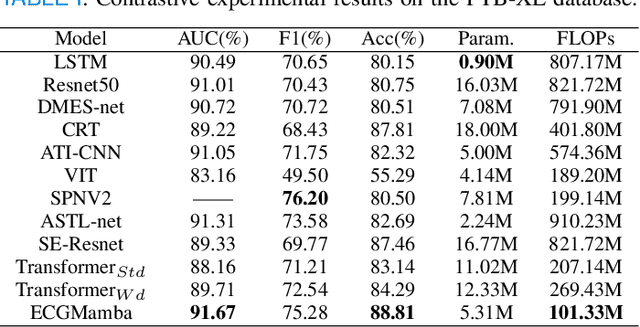Yihai Fang
ECGMamba: Towards Efficient ECG Classification with BiSSM
Jun 14, 2024



Abstract:Electrocardiogram (ECG) signal analysis represents a pivotal technique in the diagnosis of cardiovascular diseases. Although transformer-based models have made significant progress in ECG classification, they exhibit inefficiencies in the inference phase. The issue is primarily attributable to the secondary computational complexity of Transformer's self-attention mechanism. particularly when processing lengthy sequences. To address this issue, we propose a novel model, ECGMamba, which employs a bidirectional state-space model (BiSSM) to enhance classification efficiency. ECGMamba is based on the innovative Mamba-based block, which incorporates a range of time series modeling techniques to enhance performance while maintaining the efficiency of inference. The experimental results on two publicly available ECG datasets demonstrate that ECGMamba effectively balances the effectiveness and efficiency of classification, achieving competitive performance. This study not only contributes to the body of knowledge in the field of ECG classification but also provides a new research path for efficient and accurate ECG signal analysis. This is of guiding significance for the development of diagnostic models for cardiovascular diseases.
Transformer-based Named Entity Recognition in Construction Supply Chain Risk Management in Australia
Nov 23, 2023Abstract:The construction industry in Australia is characterized by its intricate supply chains and vulnerability to myriad risks. As such, effective supply chain risk management (SCRM) becomes imperative. This paper employs different transformer models, and train for Named Entity Recognition (NER) in the context of Australian construction SCRM. Utilizing NER, transformer models identify and classify specific risk-associated entities in news articles, offering a detailed insight into supply chain vulnerabilities. By analysing news articles through different transformer models, we can extract relevant entities and insights related to specific risk taxonomies local (milieu) to the Australian construction landscape. This research emphasises the potential of NLP-driven solutions, like transformer models, in revolutionising SCRM for construction in geo-media specific contexts.
 Add to Chrome
Add to Chrome Add to Firefox
Add to Firefox Add to Edge
Add to Edge